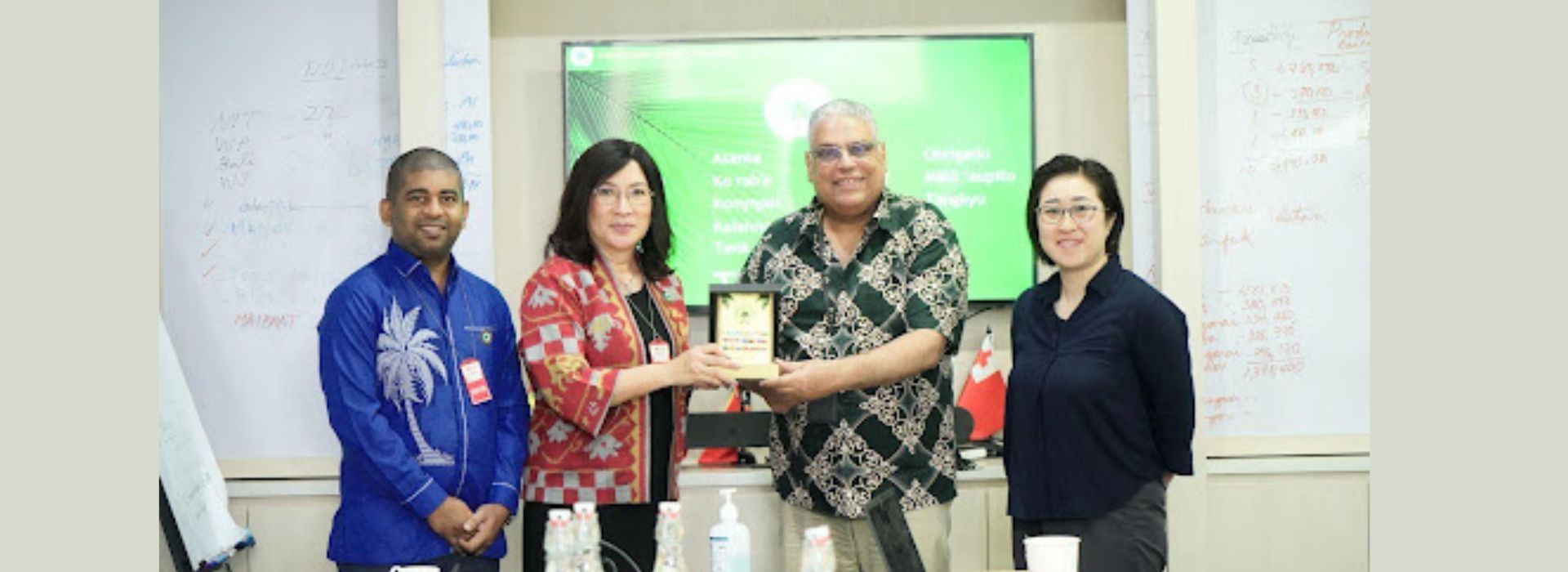The International Coconut Community (ICC), led by Director General Dr. Jelfina C. Alouw, paid a courtesy visit to the International Fund for Agricultural Development (IFAD) Regional Office for Indonesia, Malaysia and Papua New Guinea and Country Office for Indonesia, to explore potential areas of collaboration. The ICC delegation included Deputy Director General, Admin and Finance Director and Market and Statistics Director.
They were warmly received by H.E. Mr. Hani Abdelkader Elsadani, IFAD Country Director for Indonesia, and Program Officer Ms. Yumi Sakata. The meeting highlighted the shared interest of both institutions in empowering smallholder farmers, building rural resilience, and advancing sustainable agricultural development.
Coconut for Inclusive Growth and Climate Resilience
Dr. Jelfina provided an overview of ICC’s role as an intergovernmental organization representing 21 coconut-producing member countries. She outlined ICC’s mission to support the coconut industry through sustainable practices, enhanced productivity, and inclusive growth.
Emphasizing coconut's global economic significance—contributing over USD 14 billion in exports in 2023—she noted the crop’s potential to address pressing development challenges. Coconut-based solutions for biofuel, carbon sequestration, health, and nutrition were among the innovative strategies discussed. She also highlighted ICC’s major programs such as the Youth Empowerment Program, that aim to build future-ready rural economies.
IFAD’s Vision: Integrating Coconut into Rural Systems
H.E. Mr. Elsadani expressed enthusiasm for the potential synergies between IFAD’s rural development agenda and ICC’s sectoral expertise. He raised interest in exploring how coconut could be integrated with aquaculture, particularly in areas where IFAD is developing new models of sustainable farming around paddy cultivation.
He also referred to IFAD’s ongoing work in Indonesia’s Papua region, where efforts are underway to rebuild coconut production in village communities. Market access and product quality remain key challenges in these regions, making capacity building an essential area of focus for future collaboration.
Shared Priorities and Strategic Synergies
Both sides acknowledged the importance of improving access to quality planting materials, enhancing value addition, and developing smallholder-oriented agro-enterprises. IFAD expressed interest in ICC’s proposed Coconut Program for Sustainable Rural Development (CPSRD), which emphasizes diversification, enterprise development, and multi-stakeholder partnerships.
In turn, ICC highlighted the potential alignment of these efforts with IFAD-supported initiatives in the Asia-Pacific region. The meeting opened the door for joint exploration of financing modalities, pilot projects, and knowledge sharing mechanisms.

Looking Ahead
The discussion concluded with a commitment to continue exploring concrete areas for cooperation. Dr. Jelfina extended an invitation for IFAD to attend ICC’s upcoming side event at the 81st Session of the UN-ESCAP in Bangkok on 25 April 2025, focused on “Harnessing the Potential of Coconut for Food and Energy Security.” IFAD welcomed the invitation and agreed to share the meeting outcomes with its country offices in Sri Lanka and West Africa.
A Promising Step Forward
The courtesy visit reaffirmed the mutual commitment of ICC and IFAD to rural development through inclusive and sustainable agriculture. One key area of interest raised by ICC was the need for a Certified Coconut Nursery Expansion Initiative, especially in countries like Indonesia where the supply of high-quality planting material remains a major bottleneck in national replanting efforts. ICC requested IFAD’s support to address this gap, recognizing its importance in improving farmer productivity and long-term sector resilience. The alignment of ICC’s coconut-centered development strategy with IFAD’s rural poverty alleviation mandate offers exciting prospects for joint action—especially in empowering smallholder farmers and promoting climate-resilient value chains.
By building on this foundation, ICC and IFAD can together unlock the full potential of the coconut sector to deliver economic, environmental, and social impact across the Asia-Pacific and beyond.

